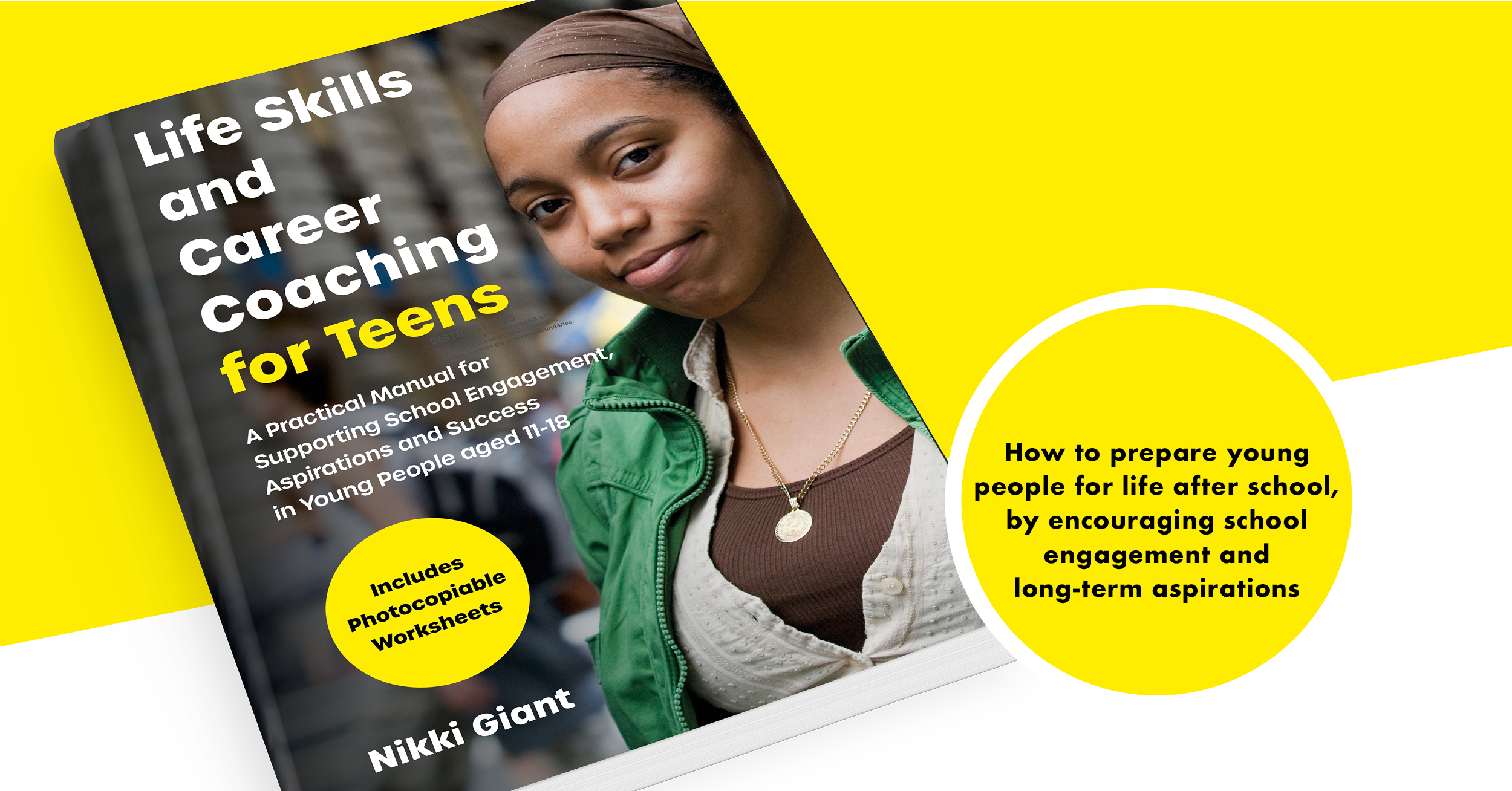Life Skills and Career Coaching for Teens: A Practical Manual for Supporting School Engagement, Aspirations and Success in Young People aged 11–18 is a book that looks at Readiness for Life (RfL), the unique, year-long curriculum-based programme, which is designed to prevent young people from disengaging from education, ambition and the learning process.
Read the extract below for an insight into Nikki Giant’s take on ‘aspiration’ and how to develop ambition in young people.
In order to develop policies and practices that seek to improve young people’s aspirations, a shared definition must be created to ensure a collective understanding of the term ‘aspiration’, so that all parties are working to the same conclusion, including parents, teachers and young people themselves. For some, positive aspirations mean striving for academic success. For others, having an aspiration is more specific and goal-oriented.
The Readiness for Life (RfL) programme views aspirations as personal and non-prescriptive. Although school attainment and qualifications undoubtedly help to improve a young person’s future chances, there cannot be a ‘one size fits all’ approach to dreams, ambitions and life goals.
The Oxford Dictionary defines an aspiration as ‘a hope or ambition of achieving something’ (Oxford Living Dictionaries, 2018). The policy and practice of raising young people’s aspirations has become increasingly common in our schools and youth settings, driven by local and national government. Rising statistics of youth absenteeism from school, poor academic attainment, and failure to progress onto further education, training or employment has driven this agenda, coupled with the often media-fuelled public outcry about the lazy, aimless and jobless ‘youth of today’ which can fuel the fire further. Young people are described as X Factor and celebrity wannabes, or government benefit scroungers in the making, dismissing the wider factors at play in this complex problem.
It is my belief that few young people have no aspirations for the future. A 2008 report by the UK’s Department for Children, Schools and Families (DCSF; now the Department for Education) found that nearly all of the young people taking part in an aspirations research study wanted to do well in life and had a sense of positive hope about the future, but that these aspirations were not necessarily linked to academic achievement and going to university.
It seems that most young people are hopeful for their future, but don’t necessarily know how to create a route to self-defined, sustainable success.
This programme recognises aspirations as personal self-defined ambitions, and has been designed on the premise that raising aspirations is not solely about improving academic achievement. Rather, improved attainment is one of many positive outcomes of the aspirations puzzle. This definition of raising aspirations describes a process of supporting youth to define and reach goals, in order to ready young people for life. Through this process, young people are encouraged to set their own measures of success and achievement. They are supported to:
- understand themselves more fully, building self-awareness
- create lifelong passions and develop a sense of purpose in life, over time
- understand that a job or career path can be fulfilling, energising and more than a way to earn an income
- become a productive and contributing member of society
- grow personally and professionally
- develop transferrable life skills
- become ready for life – not just ready for further study or the workplace.
This is also based upon the premise that aspirations will change over time – they are not static, but will shift in what could be deemed ‘positive’ or ‘negative’ directions depending upon a number of factors. It is also based on the premise that there are many different (personal) measures of success, including academic, financial, social, professional, emotional, material, etc. Each person’s aspirations may be driven by one or a number of measures, which may change over time. For example, a young man starting out on his career path might be driven by his desire to amass enough wealth to buy himself a status symbol of some sort, such as a new car. Over time, the man’s drivers might change as he starts a family and wants to develop his career in order to be a better provider for his children.
As caring adults, we want every young person to be successful and happy and to achieve in life, and it is understandable that this often equates to encouraging academic success and supporting youth to gain qualifications. It is undoubtedly true that young people who progress through the education system with a good level of educational attainment will generally earn more and have access to better opportunities than their non-achieving and early disengaged peers. But for some young people, the idea of aspiring to a university degree or a professional, well-paid job is inconceivable. This is simply not within their frame of reference. Many young people follow the life and career choices of those around them, consciously or not. In some cases, their awareness of options can be limited by a lack of diverse role models and a lack of awareness that life can be any different to the perceived norm. Therefore it is important not only that we facilitate young people’s awareness and understanding of the options available to them, but that we also seek to shift their beliefs and mindset, giving them the confidence, self-esteem and resilience they need to step into a new paradigm of opportunity. This will create a lifelong path to self-defined success and happiness.
If you would like to read more articles like this and get the latest news and offers on our health care books, why not join our mailing list? We can send information by email or post as you prefer. You may also be interested in liking our Special Education and PSHE Facebook page.
